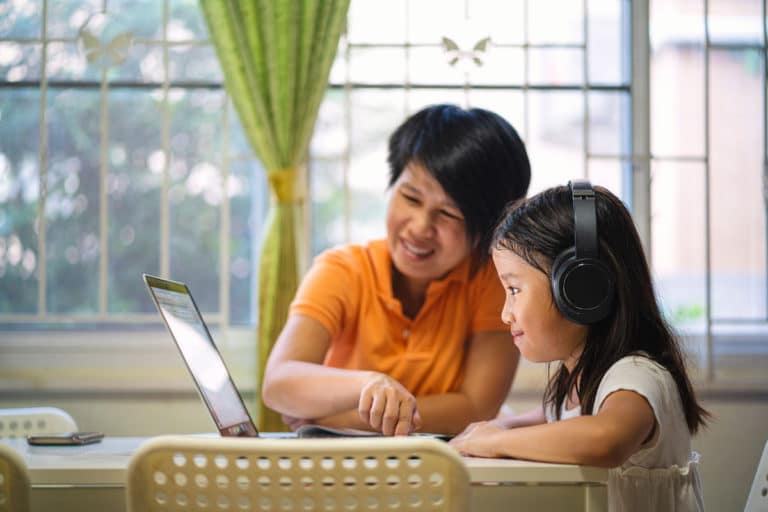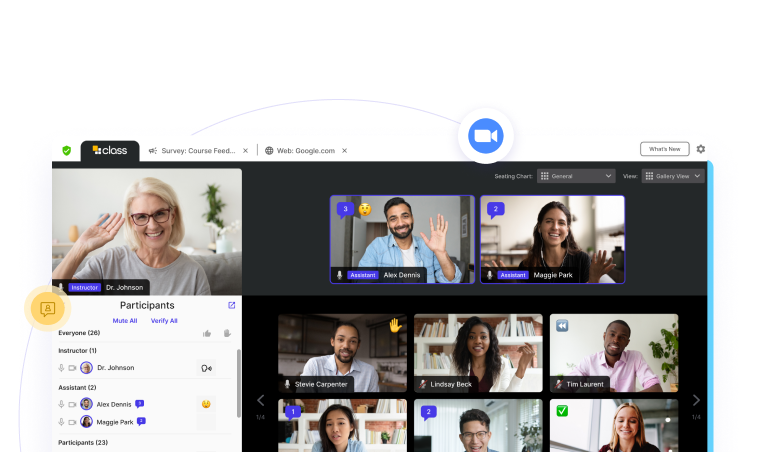
Class is the next generation virtual classroom for K-12, higher education, government agencies, and the workplace. Contact us today to schedule your live demo and see Class in action.

Class is the next generation virtual classroom for K-12, higher education, government agencies, and the workplace. Contact us today to schedule your live demo and see Class in action.

While some parents have been homeschooling their children for years now, others have been cast into this new role unexpectedly. For them, figuring out how to keep students engaged, understand online teaching strategies, and support their children in virtual learning is challenging, to say the least. Here we offer some tips from educational experts, parents, and teachers on how to help kids with online learning.
Dr. Justine Green is principal at Tamim Academy, the author of the children’s book Completely Me, and a mom of two. For younger students, Green suggests an iPad with a Bluetooth keyboard and for older students a computer or laptop. They’ll need access to wi-fi and electricity and a device with a video camera for virtual meetings and lessons. Don’t forget, though, she says, that younger students will need adult supervision. “This has been the biggest issue for many families,” she says. “Some parents work out of the house and now they need to figure out what to do about their first grader at home with virtual school.”

It’s important to have a dedicated space for online learning, says Debbie Lopez, community outreach director for Zivadream, an education advocacy and test prep review website. “It doesn’t have to be anything elaborate, just a small space dedicated as their work area for school that includes their computer, headphones, materials and supplies, a comfortable chair and good lighting,” she says. Let children help to set up and decorate their workspace. “By involving your child in the designing of their work area, they will feel a sense of pride and ownership and thus see it as a welcoming space to learn,” Lopez says.
Andreah Evans, academic language therapist and founder of Learning Differentiated, LLC, a resource for parents of struggling learners, says: “Teachers spend the first few weeks implementing procedures and expectations to ensure the rest of the year runs smoothly. Parents should instill these same expectations at home, so children know what to expect.”
For instance, one procedure might be what your child should do if they need help. Should they call for you and immediately expect an answer? Should they use sticky notes to put on sections of their work they may have questions about? If older children, should they write their questions on the note? Then, Evans says, “at a designated time you could review these questions and provide guidance.”

Amanda DoAmaral, a former teacher and the founder/CEO of Fiveable, a social learning company of online educators serving 1.5 million high school students, agrees. It’s important to keep a routine with online learning, she says. “You don’t have to wake your child up at 7:00 a.m., but create a schedule and set it together. Decide on a time that school ‘starts’ and also set aside specific times for breaks.” Setting a schedule, she says, keeps things predictable. “Students need some sense of normalcy right now and this will help.”
It truly “takes a village” to educate our children—that’s always been true, but in this new and continually changing environment, it’s more important than ever. Getting to know your children’s teachers is a “must do” these days.
Joseph Glatzer, a seventh-grade world history teacher at Hercules Middle School in the San Francisco Bay Area, says: “From a teacher’s perspective, I’d give parents a few pieces of advice. Stay in communication with teachers. Don’t be afraid to ask questions to clarify anything you’re not clear on.”
But, while it’s important to stay on top of teachers’ expectations, DoAmaral says: “Don’t feel like you have to replicate everything that would be happening in the classroom.” It’s important to keep kids engaged with online learning, she says. “Keep them writing, reading and thinking.” Watch the news together or review a documentary. “Perhaps teach them about something within your profession or even within your culture that excites you,” she suggests.
It’s good to step outside of the required curriculum to augment your children’s learning and there are a wide range of ways that you can do that.
DoAmaral suggests encouraging creativity through non-school-related means. “Encourage your student to record music, write, create art, record a podcast—anything where they can funnel creativity into their time is going to help them out because they can only be studying and worrying about their grades for so long.”
Don’t overlook the importance of reinforcement. “Parents can use screen time, desserts, trips, video games, etc., as reinforcers,” suggests Dr. Richelle Whittaker, an educational psychologist and parenting coach with Providential Counseling & Consulting Services, PLLC. For example, she says: “If you complete all schoolwork and do it willingly, then you will receive x,y,z at the end of the week.” Children may need external motivation during this time since so much has changed for them,” she says.

It’s important to continually communicate with children about what goes on each day, says Lopez. “Be sure to compliment them on their efforts. Be specific with your praise, like ‘I like the way you managed your frustration when you were having difficulty with your microphone today,’ or ‘That book report you presented to your class this morning was interesting.’ This will show your child that you notice their efforts, are paying attention and are engaged in their learning.”
Remote learning is not going to be flawless, says Lopez. But it’s important for parents to stay calm and flexible, she says. Your children are watching, and they will mirror your behaviors.
Self-care is important for parents, says Glatzer. “Spend some time outside going for walks or riding a bike. It can make a big difference.”
Finally, recommends Green: “Just do your best. Everyone is doing the best they can at this time. We have to respect each other, and the decisions others make for themselves and their families.”

Class is the next generation virtual classroom for K-12, higher education, government agencies, and the workplace. Contact us today to schedule your live demo and see Class in action.

Class is the next generation virtual classroom for K-12, higher education, government agencies, and the workplace. Contact us today to schedule your live demo and see Class in action.
Get our insights, tips, and best practices delivered to your inbox

Sign up for a product demo today to learn how Class’s virtual classroom powers digital transformation at your organization.

Features
Products
Integrations